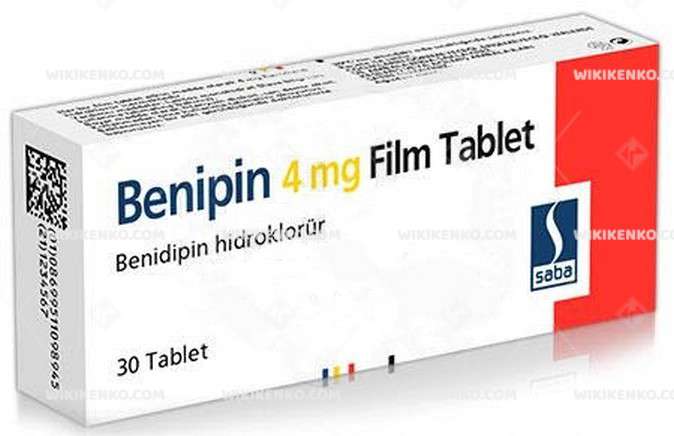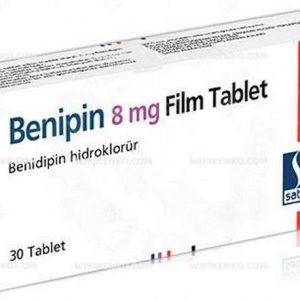Benipin Film Tablet 4 Mg
Enter the world of Benipin, a pharmaceutical gem hinging on the potent benidipin hydrochloride. This comprehensive guide aims to elucidate the intricacies of Benipin, from its uses to contraindications, dosages, onset of action, elimination, and the crucial question of addiction.
| Dosage form | |
|---|---|
| Pack size | |
| Potency | 4 Mg |
| Manufacturer | |
| Origin | |
| Generic Name (Ingredient) | Each Film Contains 4 Mg Of Benidipine Hydrochloride As The Tablet-Active Substance. |
Assuming your emergency circumstances for this product, visit Urgent Quotation page. Besides, for any pharmaceutical questions, please ask us in the comments section.
Description
Benipin is a medication distinguished by its active ingredient, benidipin hydrochloride. Each film tablet is graced with 4 mg of this potent compound. The overarching purpose of Benipin is the regulation of blood pressure, and it is conveniently available in boxes containing 30 tablets.
Applications
Benipin’s efficacy is manifest in its diverse applications, primarily addressing:
- Hypertension (High Blood Pressure): The cornerstone of Benipin’s use, maintaining healthy blood pressure.
- Renal Parenchymal Hypertension: A specialized focus on high blood pressure associated with kidney disease.
- Angina Pectoris: Alleviating chest pain arising from the constriction of arteries supplying the heart.
Uses
The cautious administration of Benipin refrains from the following scenarios:
- Cardiogenic Shock: A critical condition where the heart’s pumping capacity diminishes, leading to inadequate tissue blood supply.
- Pregnancy: A period during which the use of Benipin is discouraged to safeguard maternal and fetal well-being.
Precautions
Embarking on the Benipin journey demands awareness in the following circumstances:
- Low Blood Pressure: Caution is warranted if you have a history of remarkably low blood pressure.
- Liver Impairment: Patients with significant liver function issues should exercise prudence.
- Elderly Patients: A watchful eye on elderly individuals who embark on this treatment.
Dosage
Benipin’s dosage is finely calibrated according to the specific medical condition it aims to address:
- Hypertension (High Blood Pressure): For adults, the recommended initial dosage falls between 2-4 mg once daily, which can be adjusted to 8 mg once daily if deemed necessary.
- Angina Pectoris (Chest Pain Due to Heart Disease): In this case, adults are typically prescribed 4 mg twice daily.
It’s imperative to acknowledge that these are general recommendations. The exact dosage should be personalized by a healthcare provider, catering to the unique requirements of each patient. Compliant adherence to the provider’s guidance is paramount.
Onset of Action
The precise onset of Benipin’s action remains undisclosed in the search results. However, the enduring effect of this medication can be attributed to its high affinity for cellular membranes from the dihydropyridine (DHP) binding site.
The temporal aspect of drug effectiveness hinges on multifaceted factors, encompassing the targeted medical condition, the patient’s metabolic profile, and concomitant medications. For precise insights, consultation with a healthcare provider is the recommended course of action.
Departure of Benipin
The enigma of Benipin’s elimination half-life remains a mystery in the search results. Nevertheless, it’s a well-established pharmacological fact that, in general, a drug requires approximately five half-lives to be completely purged from the body.
The precise duration of elimination varies individually, influenced by factors such as an individual’s metabolism, age, and concurrent medications. In light of these variables, it is wise to consult with a healthcare provider for personalized information.
Addiction
The search results lack specificity regarding whether Benipin (benidipin hydrochloride) can elicit addiction or dependence. The nuances of drug dependence and addiction represent a multifaceted realm that can encompass various substances, including prescription medications.
Dependence entails the manifestation of physical withdrawal symptoms and tolerance, while addiction embodies long-term behavioral, social, and physical changes. It’s crucial to recognize that physical dependence on prescription medications can occur without the presence of addiction.
To traverse this complex landscape, it is always prudent to adhere to a healthcare provider’s directions regarding medication use. Any concerns or queries about dependence or addiction should be discussed with them. Their expertise is the guiding light to ensure your well-being.
Conclusion
In the realm of pharmaceutical science, Benipin takes center stage as a potent guardian of cardiovascular health. Armed with benidipin hydrochloride, it stands as a versatile solution, from blood pressure regulation to angina pectoris relief. However, this therapeutic journey demands adherence to medical guidance and the unwavering oversight of healthcare professionals. The quest for health, as illuminated by Benipin, is one that thrives on knowledge and vigilance.
Overview
| Attribute | Description |
|---|---|
| Active Ingredient | Benidipin hydrochloride, the powerhouse |
| Tablet Strength | Each film tablet houses 4 mg of the active ingredient |
| Primary Purpose | Lowering high blood pressure |
| Secondary Applications | Renal parenchymal hypertension, angina pectoris |
| When Not to Use Benipin | Cardiogenic shock, pregnancy |
| Precautions | Low blood pressure, liver impairment, age |
| Dosage Recommendations | Tailored to the condition, ranging from 2 to 8 mg |
| Onset of Action | Long-lasting effects, owing to high membrane affinity |
| Elimination Half-Life | Varies individually, typically 5 half-lives |
| Addiction Potential | Complex issue, requires cautious use |
Use the form below to report an error
Please answer the questions as thoroughly and accurately as possible. Your answers will help us better understand what kind of mistakes happen, why and where they happen, and in the end the purpose is to build a better archive to guide researchers and professionals around the world.
The information on this page is not intended to be a substitute for professional medical advice, diagnosis, or treatment. always seek the advice for your physician or another qualified health provider with any questions you may have regarding a medical condition. Always remember to
- Ask your own doctor for medical advice.
- Names, brands, and dosage may differ between countries.
- When not feeling well, or experiencing side effects always contact your own doctor.
Cyberchondria
The truth is that when we’re sick, or worried about getting sick, the internet won’t help.
According to Wikipedia, cyberchondria is a mental disorder consisting in the desire to independently make a diagnosis based on the symptoms of diseases described on Internet sites.
Why you can't look for symptoms on the Internet
If diagnoses could be made simply from a textbook or an article on a website, we would all be doctors and treat ourselves. Nothing can replace the experience and knowledge of specially trained people. As in any field, in medicine there are unscrupulous specialists, differences of opinion, inaccurate diagnoses and incorrect test results.




Reviews
There are no reviews yet.